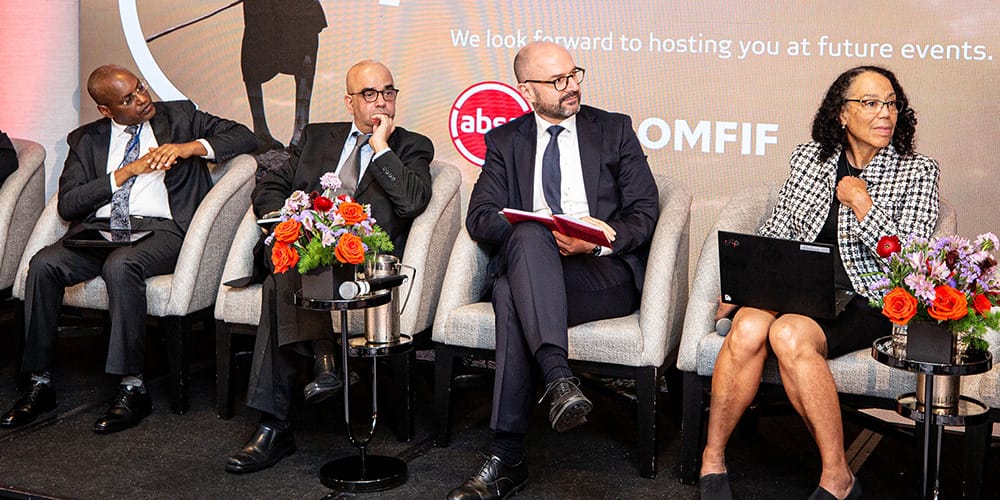Summary
- Private capital investments in Africa decreased by 24%, dropping to $5 billion in 2023 from $6.5 billion in 2022, which has led to a downturn in the continent’s financial market.
- Investment in private capital has become increasingly focused at the national level, with South Africa producing half of all such investments in Africa.
- South Africa continues to be recognized as the most advanced and developed financial market on the continent.
In-Depth Analysis!
Africa’s financial markets showed impressive resilience and growth in 2015, overcoming global economic hurdles through strategic changes, technological innovations, and greater investor engagement.
The Africa Financial Markets Index (AFMI) Report 2024, created by OMFIF in partnership with Absa Group Limited, predicts that the financial market will trend upward in 2025. It provides a thorough analysis of 29 African nations, based on six key factors: market depth, foreign exchange accessibility, transparency and regulation, local investor capacity, macroeconomic potential, and enforceability of financial agreements.
These enhancements are particularly encouraging given that experts reported a 24% drop in private capital investments in Africa, falling to $5 billion in 2023 from $6.5 billion in 2022, which negatively impacted the region’s financial landscape. Like many global markets, African financial systems have been strained by tighter financial conditions, slowing growth, rising inflation, depreciating currencies, and dwindling foreign exchange reserves.
Throughout this period, African stocks experienced a sharper decline compared to those in other emerging and developing markets, driven by global investors’ increased risk aversion towards the continent. Rising interest rates led to lower stock valuations in Africa, with total returns (excluding dividends) falling at the beginning of the interest rate increase cycle in 2021 and remaining around zero in 2023.
By the second quarter of 2025, African financial markets have met expectations, showing improvements thanks to stronger economic growth, lower inflation, and ongoing regional integration. These advancements have also been spurred by economic reforms, falling inflation rates, and better fiscal and debt management. While growth forecasts remain positive, the continent is still susceptible to global crises.
This article explores the top 10 African nations with the most developed financial markets in 2025, emphasizing their accomplishments, reforms, and contributing factors to their success.

Discover the Top 10 African Countries with the Most Developed Financial Markets in 2025!
10. Ethiopia
- Strengths: Initiatives aimed at diversifying the financial sector and attracting both local and foreign investments.
- Highlights: The launch of the Ethiopian Securities Exchange (ESX) in January 2025 signifies a major advancement in modernizing the country’s financial landscape. Ethiopia has also implemented substantial foreign exchange reforms toward a more market-centric model.
9. Rwanda
- Strengths: Adoption of ESG assets and climate-focused financial regulations.
- Highlights: Rwanda has made notable progress in refining its financial market framework to enhance investment attractiveness and stabilize the economy. The country launched its first domestic sustainability-linked bond in September 2023, along with new climate financial regulations, boosting its overall score by three points.
8. Egypt
- Strengths: Extensive banking reforms and increased financial inclusion.
- Highlights: Egypt’s financial sector has undergone substantial modernization, aligning with global standards despite facing challenges like international tariff issues and slower economic growth. The country has implemented important foreign exchange reforms transitioning to a market-based approach.
7. Ghana
- Strengths: Strong equity market performance and improving investor sentiment.
- Highlights: The Ghana Stock Exchange (GSE) was recognized as Africa’s top-performing market in 2024, driven by robust corporate earnings and favorable conditions. Ghana’s commitment to financial reforms has boosted market transparency and investor confidence.
6. Botswana
- Strengths: Stable macroeconomic climate and sound regulatory practices.
- Highlights: Botswana improved its ranking from 7th to 6th in the Absa Africa Financial Markets Index 2024, achieving 59 points, up from 58 the previous year. The introduction of Botswana’s first sustainable bond on the Botswana Stock Exchange in December 2023 contributed to this ranking enhancement.
5. Morocco
- Strengths: Diverse economy, advantageous location, and robust institutional frameworks.
- Highlights: The Casablanca Stock Exchange is ranked as Africa’s third-largest, showcasing Morocco’s dedication to financial sector development and integration into the global economy. Strategic reforms have significantly increased investor confidence and market depth.
4. Kenya
- Strengths: Innovative financial services and mobile money solutions.
- Highlights: The Nairobi Securities Exchange (NSE) in Kenya has shown growth and resilience, reporting considerable gains in 2024 with sustained investor trust. The pioneering mobile money services have notably improved financial inclusion and market engagement.
3. Nigeria
- Strengths: Africa’s largest economy with a vibrant fintech scene and an expanding capital market.
- Highlights: Nigeria’s financial sector has seen growth backed by a dynamic fintech market that comprises 28% of Africa’s fintech companies. However, issues like high inflation and foreign exchange shortages have affected its overall performance.
2. Mauritius
- Strengths: Strong legal structures, investor-friendly regulations, and a well-supervised financial sector.
- Highlights: Mauritius consolidates its role as a financial center in Africa, focusing on offshore banking and investment services. Its stable political climate and dedication to regulatory excellence make it a preferred site for investors aiming to engage with African markets.
1. South Africa
- Strengths: Deep, liquid markets with a robust regulatory framework and a variety of financial instruments.
- Highlights: South Africa retains its status as Africa’s most sophisticated financial market. The Johannesburg Stock Exchange (JSE) is the continent’s largest and most advanced, offering an extensive array of financial products and attracting significant foreign investments. Despite the challenges posed by the global economy, South Africa’s financial landscape has shown resilience, with inflation easing to 2.7% in March 2025, a five-year low, allowing for potential monetary easing.


